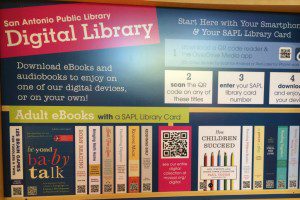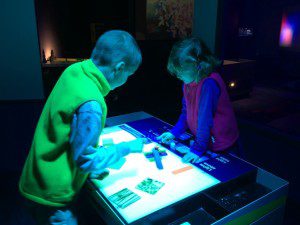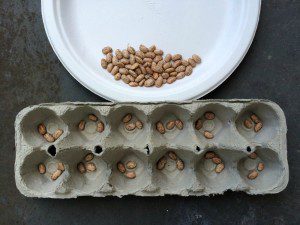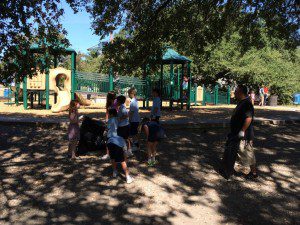All parents want to give their children the best chances to succeed in life. Sometimes, the things we want for them seem out of reach. (For example, I’m trying to not freak out about how to pay for college.) The good news is that many of the most important things we can do for our kids are free, or almost free. Here is a localized list of low-cost brain boosters for San Antonio kids.
10. FREE: Get a library card at the San Antonio Public Library. In addition to offering books and e-books, the library hosts free events at Central Library and branches across town. Perhaps you saw America’s recent post about activities over the winter break, or her earlier post with tips about homework help, test prep, and other programs that might be new to you.
Once you have your library card and you’ve checked out some books, then it’s time to build good habits: read to your kids often, and let your kids see you reading. (My rant about PTAs also has reading tips and links.)
9. FREE: Go to local museums during the hours that they offer free admission:
- The DoSeum: H-E-B Free Family Night on the first and third Tuesdays of the month from 5:30–7:30 P.M.; next dates: January 5 & 19.
- Witte Museum: For #FreeKnowledge #FreeTuesday, free general admission every Tuesday from 3:00–8:00 P.M.; next dates: January 5, 12, 19, and 26.
- San Antonio Museum of Art: Free general admission on Tuesdays from 3:00–9:00 P.M. and Sundays from 10:00 A.M.–12:00 P.M.
- Briscoe Western Art Museum: Free admission on Tuesdays from 4:00–9:00 P.M.
- McNay Art Museum: Free general admission on Thursdays from 4:00–9:00 P.M. (next dates: January 7, 14, 21, and 28) and on the first Sunday of the month from 12:00–5:00 P.M. (next date: February 7).
- Institute of Texan Cultures: Free admission on the second Sunday of the month from 12:00–5:00 P.M.; next date: January 10.
Schedules can change, so you might want to check with each museum before you go.
ALMOST FREE: Get a family membership to your favorite museum; if you use your membership often, the cost per visit gets really low.
8. FREE: Play mental math games. Depending on your kids’ comfort level with math, you could start with simple counting, then go to odds and evens, and then do skip counting by threes, fours, and so on. We play a game in the car: little sister G.N. picks a random number and then big brother F.T. has to subtract that number from 100. Do the games in Spanish as well as English.
ALMOST FREE: Buy some simple toys for math games. You might be surprised what you can do with a deck of playing cards or a bag of pinto beans and an empty egg carton or divided plate.
7. FREE: Engage in memory work. When you commit a poem to memory, it becomes part of you. Poetry becomes part of your mental furniture. It can help you navigate emotional situations throughout your life and gives you a level of cultural literacy that helps you connect with other educated people. Memorization is not a chore; it expands your mind. Many classic poems are in the public domain (i.e., no longer copyrighted) and are available free on the Poetry Foundation website.
Poetry wars are fun. Get your kids to challenge their friends to recite poems to each other. My kids do this at school. Oh, the stories they bring home!
ALMOST FREE: Buy some paper so your kids can write down their own poems. Then, in September, you can submit them to the library’s Young Pegasus poetry competition.
6. FREE: Sing songs. Young voices can make beautiful music with no instruments. The sounds help train the mind to hear scales and harmonies that form the basis of our music system, and lay the foundation for a child to appreciate classical music and to learn to play an instrument later. There are free web resources for classic songs, including here and here. Singing in the car is a great way to pass the time while commuting or road tripping.
ALMOST FREE: Build your own musical instruments using junk from the recycle bin: tubes, boxes, rubber bands, foils pans, etc.
5. FREE: Play outside, but with two conditions: First, stop micromanaging; and second, let your kids get dirty.
Playgrounds are great, but there is more to nature than monkey bars and mulch. If you want kids to get curious about the natural world, it’s important to give them more freedom to get off the beaten path. Let them pick up a handful of soggy leaves and notice the differences among leaves from different types of native trees. Go outside each season to see the changes and visit different ecosystems.
ALMOST FREE: Join a community garden or plant a garden at home.
4. FREE: Encourage entrepreneurship. Help your kids brainstorm what kinds of additional chores they can do for your family (or for friends and neighbors) to earn extra money. Depending on your kids’ ages and skills, they might be able to sell their crafts online or even write a mobile app.
ALMOST FREE: Give your kids some startup capital. For example, you could give them some lemons, sugar, and cups for their lemonade stand.
3. FREE: Volunteer. When kids give their time for a cause, it helps them develop empathy for how other people live, whether those people are from different cultures, have different amounts of wealth, or have different abilities. Some organizations, such as the San Antonio Food Bank, San Antonio Parks and Recreation, and SA2020, have volunteer jobs for kids and teens.
ALMOST FREE: Save up spare change to donate to a cause. Let your kids research where to donate. The Big Give SA, on May 3, 2016, will be an opportunity for them to amplify their gifts.
2. FREE: Say “no” to your kids. Resilience is a skill that comes from overcoming obstacles, from facing disappointment and trying again. Perhaps you have heard the phrase “don’t eat the marshmallow…yet!” It’s good advice. A study showed that young children who were able to resist eating a marshmallow—and thereby earned two marshmallows for waiting—turned out to be more successful as teenagers and adults.
ALMOST FREE: Treat yourself to a chocolate bar or glass of wine at the end of a long day of saying “no” to your kids.
1. FREE: Love. From your smile when you serve them their breakfasts in the morning to the kisses on their foreheads when you tuck them in at night, the love you show your children gives them the strength and security to overcome the challenges they face every day.[hr]
Maybe my top 10 brain boosters list isn’t what you expected. But success in life is about more than just being smart: it’s also about being a good person and having the maturity to make good choices.
What are your suggestions? Please share in the comments.



















Love this post! I’ll be sharing it far and wide. 🙂
Thank you, Melissa!
Cost does not need to be barrier when it comes to learning and having fun.